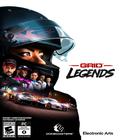Leading up to GRID Legends' release later this month, I was invited to check out the multiplayer. Some peers, the game developers, and I hopped on a Discord server and started setting up multiplayer lobbies using the in-game tools. I can't speak to random multiplayer lobbies having quite as much witty banter as we did, but it gave me a good impression of the game's multiplayer. I even turned an EA server issue into my favor and tested out the "join in progress" functionality.
We played a few different events and ran the gamut from normal circuits in sedans to open wheel racers, and then we bounced into electric Formula cars and ended in a drift competition. Regardless of the lobby, it was a matter of using the browser to track down an event and join it. Since you play multiplayer with the same profile that you use to play single-player, it also carries over things such as your current car collection. For us, that meant our car collection was barren, but for the sake of multiplayer, the game allows you to "lease" a car for that event. You make a bit less money, but it lets you participate in lobbies where you don't own one of the required vehicles.
Even on a leased vehicle, you are allowed to tweak the tune setup before the event begins. This interface is streamlined down to simplified sliders; you won't have to worry about half a pound of tire pressure. You move the slider between "short" and "long" on gear ratios or "soft" or "hard" for various suspension categories. These are still impactful, and players who know what they are doing will get some value out of tuning their car to fit their style and the course. For those who don't know what they are doing, the game does a passable job of explaining the options, but it'll still boil down to some trial and error to find the best setup.
Racing against the AI is one thing, but to get a better measure of how competitive a racing game is, it generally requires you to race against other human players. With competitors who had experience ranging from "I may only occasionally play racing games," to "I literally designed this game," GRID Legends allows for plenty of competition. Pitched battles up and down the order were common, and it was great fun fighting for every position I found myself in. Most importantly, it felt like driver skill mattered; the people who were able to successfully carry speed around corners and slip through the correct apexes were the ones leading the charge. GRID Legends may not be a sim, but any quick lap was clearly the result of dozens of smaller choices that you made during that run.
Finally, it happened. I was in an electric Formula car ("Don't call it Formula E!"). I navigated the carnage of the first couple of turns, made up a bunch of places, found myself in first place … and EA's servers killed my connection. This gave me the opportunity to test the game's ability to let you join races that are in progress. Races can be a mix of human players and AI /9if needed), and people wanting to jump into the action can join at any point and take over a random AI participant. You get a few seconds of watching the AI control to gracefully let you take the wheel, and it works surprisingly well. It helps that I randomly rejoined as the first-place driver, who was apparently taken over by an AI upon my disconnect. I still call that my win.
GRID Legends is just a fun game to play with others. Slamming 22 stadium trucks into a road course is madness, especially when behind every wheel is an actual human player who's giggling because half of the field is upside-down and airborne in the melee of the first corner. It tests your mettle, and you feel like you earn victories in a way that never feels super serious. As knife-edge as it can be to rip a Hellcat through the rainy streets of Moscow, bumper to bumper with your rival as you both struggle to put grip down through the water on course, a battle for "merely" seventh place feels simultaneously consequential and joyous.
I didn't have specific expectations about the multiplayer portion of GRID Legends, but it strikes a good balance between the carefree fun of an arcade-style game while still allowing for the skill and competitive balance that people want out of more simulation-style racing. It is comfortable in the balance that it has struck between those two differing (and somewhat opposing) styles, and it remains fun throughout every race. I look forward to checking out the full multiplayer experience when GRID Legends launches later this month.
Previewed on: AMD Ryzen 7 3700X, 32 GB RAM, NVidia GTX 2070 Super, Xbox One Controller
More articles about GRID Legends












 GRID Legends is a high-stakes driving experience that combines thrilling motorsport action, incredible race variety and an immersive story that puts the player at the heart of the action.
GRID Legends is a high-stakes driving experience that combines thrilling motorsport action, incredible race variety and an immersive story that puts the player at the heart of the action.


























